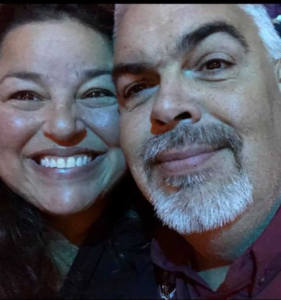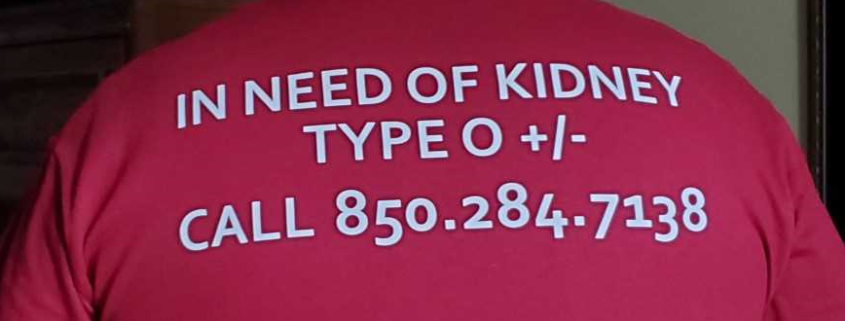The Wait
Some people feel a sense of dread when they get a phone call from an unknown number. That was not the case with Paul Croft, who felt a surge of adrenaline when his phone rang at 4 p.m. on a Tuesday afternoon. He knew the drill. Answer your phone at all times of the day or night, especially if it is from the hospital.

Croft is going to great lengths to find a kidney donor.
“They notified me I was on standby,” Croft said. The Tallahassee resident has been on the waiting list for an organ transplant for a year.
It is common for patients like Croft to be called about an organ offer. One patient will be the primary candidate and the others will be backups in case the primary is not available or eligible.
“Two hours later I got the call that I was the primary recipient,” he said.
It was go time. Croft, who lives with end-stage renal disease, was next in line for a life-saving kidney transplant. Finally, he would get a second lease on life.
Like many patients waiting for the call, Croft planned for this moment. His suitcase was packed. He leapt into action and telephoned family and friends who had agreed to care for his special needs son on a moment’s notice.
Then he and his wife, Debra, waited.
“It’s tough to wait,” Croft said. “You can’t let it consume you. If you do, it’ll just tear down your physical and mental health.”
Croft was not prepared for the heartbreak that lay ahead. The transplant team determined the donor organ was not suitable for him. He would not get the kidney transplant he desperately needed after all. At least not this time.
Sometimes a patient is placed on standby or reports to a transplant center for a potential offer, but then does not receive the transplant. Dry runs can be emotionally draining but are a normal part of the donation process.
“I went from low to craziness to very high and back again,” Croft said. “It’s like the drop on a roller coaster. I was a little ‘blahed’ out and exhausted from it all.”
Croft began to research organ donation, how it works and why it takes so long for patients like him to find a suitable match for a transplant. The facts were a sobering reminder the odds are not in his favor. More than 112,000 patients in the United States are waiting for organ transplants. Each day, 10 people are added to the list. About 20 people die every day while waiting for an organ transplant.

Croft pleads for a donor on the back window of his red Ford Edge.
Because Croft needs a kidney, the mission to find a donor match is even more daunting. Nearly 85 percent of patients on the transplant list are waiting for kidneys. The average wait time for a kidney is three to five years. Nearly 5,000 people die every year waiting for a kidney transplant and another 5,000 are taken off the list because they are no longer healthy enough to receive a transplant.
“Some days are very agonizing because with social media you read how the list is growing, along with the need for kidney transplants nationwide,” Croft said. “It makes you wonder, when will it be your turn?”
The emotional letdown was a turning point for the 66-year-old grandfather of four who is beating the odds – barely. Like many patients who are waiting for organ transplants, Croft has learned to live with a real risk of death. Even so, it has not weakened his instinct to survive.
“I’m hoping for a living donor,” he said, optimistically.
A kidney transplant could happen sooner if a patient has a family or friend who is willing to be a living donor. A living donor must be tested to see if he or she is a match for the patient. If a person has no willing, matching, living person to donate to him or her, then they are placed on a list and must wait for a kidney from a deceased donor.
Because there are no guarantees, Croft joined a growing number of patients who have launched their own search for an organ donor while remaining on the wait list. His public pleas, visible on cars, clothes, and social media in the Tallahassee area, grow bolder with each passing day.
So far, he has put the word out to family and friends, shared his plight with members at the church where he attends, and posted appeals on Facebook. He made t-shirts with the tag line, “In need of kidney,” and displayed a sign proclaiming his need for a type-O kidney donor on the back window of his red Ford Edge.

Croft made t-shirts asking for a kidney.
If all of this is not enough – and so far it is not – Croft asked Lamar Advertising in Tallahassee to help promote his search for a kidney donor. They happily obliged.
“I told him, we’ll help you out where we can,” said Chad Oaks, Lamar Advertising real estate manager. “Then COVID-19 hit.”
Croft’s “SHARE YOUR SPARE” trailer appeared on donated billboards in and around Tallahassee for months leading up to the pandemic, when the ads were abruptly supplanted by public service announcements from the Florida Department of Health.
Croft did not find a donor, but his outdoor media messages gave another man the courage to run his own billboard campaign with Lamar Advertising, also pleading for a kidney donor.
“This is what’s it’s come to,” Croft said. “As the years progressed my kidney disease progressed, and that’s how I got to the point where I am today. I just want to be healthy for my son. He still needs me.”
To look at him, you would not know Croft is battling stage 5 chronic kidney disease. He has diabetes, but has managed to stay off dialysis. He works in his yard every day and, except for failing kidneys, his overall health is good. A paradox faced by many patients waiting for an organ transplant.
“To look at me you wouldn’t think, I need to donate a kidney to that guy,” Croft said. “I may look good, but my kidneys are declining.”
Time on the wait list can vary, leaving many patients and caregivers feeling powerless. Keeping appointments and staying in contact with the transplant team are ways to feel more in control during the waiting process.

Robert and Betty Morales know how it feels to wait.
Betty Morales’ husband, Robert, has been waiting for a kidney for more than year since being diagnosed with Wegener’s disease. Unable to manage his illness and unwilling to stand by and do nothing, she trained as a LifeQuest ambassador to become an advocate for organ donation in the Tallahassee community.
Morales shares candid posts about the couple’s transplant journey on her Facebook page, and she speaks in high schools and at public events. Robert, who volunteers as a coach at Leon High School, was recently featured in a story on WTXL-TV, in part because of his wife’s community involvement.
“This is a terrifying time for us,” Morales said.
Emotional ups and downs while waiting for a transplant come with the territory. The upside is that in 2019 more than 40,000 organ transplants were performed in United States, and 7,300 of them were made possible by living donors. Donors give others a second chance at life, and many donor families are comforted in knowing their loved one helped save others.
“I believe in God and God has a hand in this,” Croft said. “I just have to be patient, even if some days are better than others.”
To view the WTXL-TV story mentioned above, please visit: https://www.wtxl.com/sports/high-school-sports/leon-high-football-coaches-family-bond-goes-beyond-the-game







